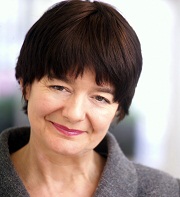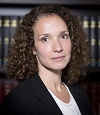Lisa Busch QC – Landmark Chambers, London
 Lisa Busch QC was called to the Bar in 2000 and appointed Queen’s Counsel in 2016. Lisa practices in planning and environmental law and in human rights, including in a number of the leading cases concerning Articles 3 and 8 of the ECHR in the immigration context. Lisa also deals with immigration cases generally, including ones involving human trafficking, victims of torture and unlawful detention cases. She has been on the Attorney-General’s Panel since 2005, acting for a wide range of Government departments including the Departments for Health, Education, Communities and Local Government, Justice, Transport and the Home Office. Lisa has recently appeared in a number of cases concerning the removal of claimants (adults and children) suffering from life-threatening illnesses from the UK. She has acted for both claimants and defendants in a number of cases involving the public sector equality duty.
Lisa Busch QC was called to the Bar in 2000 and appointed Queen’s Counsel in 2016. Lisa practices in planning and environmental law and in human rights, including in a number of the leading cases concerning Articles 3 and 8 of the ECHR in the immigration context. Lisa also deals with immigration cases generally, including ones involving human trafficking, victims of torture and unlawful detention cases. She has been on the Attorney-General’s Panel since 2005, acting for a wide range of Government departments including the Departments for Health, Education, Communities and Local Government, Justice, Transport and the Home Office. Lisa has recently appeared in a number of cases concerning the removal of claimants (adults and children) suffering from life-threatening illnesses from the UK. She has acted for both claimants and defendants in a number of cases involving the public sector equality duty.
Lisa did her BA at the University of Western Australia, followed by a BPhil and Master of Studies at Oxford and then attended bar school in London. She garnered an impressive number of scholarships, bursaries and prizes, without which Lisa says she would not have been able to achieve her ambition of becoming an advocate. She did her pupillage in a large planning and public law set and found environmental issues particularly interesting, while her choice of public law and human rights stem from her keen interest in social and political issues.
Lisa says that as she found herself increasingly up against QCs, she began to think about applying for silk, with encouragement from a number of judges before whom she appears. She was also at a stage where she felt that she had sufficient cases of substance and potential assessors (particularly judges) to make a viable application for QC. She had been instructed in the HS2 inquiry which had dominated her practice for two years, and so had to go back three years for some of her cases but was confident that she had the necessary cases of substance to present to the Panel.
Lisa found the application process “fascinating” in terms of how the Panel sought evidence of excellence, and also a fair one. However, she also says it was stressful in that “you are very dependent on your assessors to support your application” and provide the vital evidence of excellence against all the competencies. Lisa feels that she was fortunate that within an otherwise extremely busy period she managed to find a relatively quiet week in which to complete the lengthy and rather demanding application from. With hindsight, she says she would have found that keeping a real-time log of her cases would have assisted her in completing the form – and she would recommend this simple device to future applicants. Lisa says that she “really enjoyed the interview, despite being poorly.” She says she felt, however, that she knew the interview was going well from the interest which the two interview panel members showed in her responses to their questions.
Lisa is critical of those in the profession who are cynical about diversity (one of the five competencies in the process) as she considers that an awareness of and proactivity in issues of diversity is vital as an advocate. She says that she emphasised to the interviewers what she did in this sphere in relation to her numerous immigration and asylum cases, right at the beginning of the interview.
It was still early days but Lisa expected her workload as a QC would increase, although not necessarily in the short-term as she was acutely aware that she would in effect have to “start anew” as she built up a silk-level practice. She accepted that this prospect – whilst “somewhat daunting” – was “an inevitable part of the process on becoming a QC”.
Lisa said that mentoring had not featured in her preparation for making a silk application. She did discuss her application in chambers but she did rather wonder whether any system of mentoring could really fit comfortably with the professional independence that one needed to maintain as a member of the Bar.
Finally, Lisa said that people should not make assumptions about the Bar – it was now far more diverse than the stereotype of a homogenous white, male, middle-class preserve, which in the past it had borne rather close resemblance to. She was aware that she was a good example of that increasing, but far from perfect, diversity at silk level, as a woman who financed herself through further education and bar school with the assistance of hard-won scholarships and the like.
© Queen’s Counsel Appointments Ltd
- Date: March 25, 2019
- Category: QCA Profiles 2016


